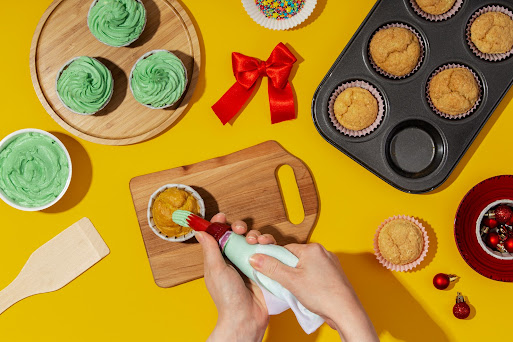Cooking and Baking for Holiday Celebrations: Life Skills and Educational Benefits for Homeschooled Children
Homeschooling provides a unique opportunity for children to learn in a personalized environment, and integrating cooking and baking into their curriculum can offer numerous educational benefits. As we explore the joys of holiday celebrations in the kitchen, let's delve into how these culinary activities can positively impact homeschooled children, fostering not only a love for food but also crucial life skills.
1. Hands-On Learning and Practical Application: Incorporating cooking and baking into homeschooling engages children in hands-on learning experiences. Rather than simply reading about recipes in a textbook, they get to apply mathematical concepts (measuring ingredients), scientific principles (observing chemical reactions), and language arts skills (following instructions) in a real-world context. This practical application enhances their understanding of various subjects and makes learning more tangible and enjoyable.
2. Culinary Science Exploration: The kitchen serves as a science laboratory, and homeschooling parents can leverage holiday cooking and baking to teach fundamental scientific concepts. For example, children can explore the chemistry of baking by observing how ingredients interact and transform during the cooking process. This experiential learning approach not only sparks curiosity but also lays the foundation for a deeper understanding of scientific principles.
Cultural Studies and Geography: Holidays often come with traditional dishes that have cultural significance. Homeschooled children can embark on a journey of cultural studies and geography by exploring the origins of holiday recipes. Learning about different ingredients, cooking techniques, and the stories behind these dishes broadens their cultural awareness and provides a rich context for understanding diverse traditions around the world.
3. Mathematics and Measurement: Cooking and baking involve precise measurements, making it an ideal setting for reinforcing mathematical skills. Homeschooled children can practice fractions, ratios, and conversions while measuring ingredients for recipes. This practical application of mathematical concepts not only reinforces academic learning but also instills a practical understanding of mathematical principles.
4. Time Management and Planning: Planning a holiday meal requires effective time management, and homeschooling parents can use this opportunity to teach children valuable organizational and planning skills. From creating a cooking schedule to coordinating different aspects of the meal, children learn to manage their time efficiently—a skill that extends beyond the kitchen into various aspects of their academic and personal lives.
5. Life Skills and Independence: Beyond academic benefits, cooking and baking foster essential life skills such as independence and self-sufficiency. Homeschooled children gain confidence in the kitchen, learning how to prepare meals for themselves and contribute to family gatherings. These skills lay the groundwork for a lifetime of healthy eating habits and self-reliance.
1. Recipe Research and Selection: Encourage homeschooled children to research traditional holiday recipes from various cultures. Have them explore the historical and cultural significance of these dishes, fostering an understanding of global traditions.
2.Mathematical Measurements Challenge:
Turn baking into a fun mathematical challenge. Ask children to double or halve a recipe, requiring them to apply mathematical concepts such as fractions and ratios. This not only reinforces math skills but also demonstrates the real-world applications of these concepts.
3. Scientific Experimentation: Transform the kitchen into a science lab by conducting simple experiments. For instance, observe how different ingredients (baking soda, yeast, etc.) react to create chemical changes. This hands-on approach enhances their understanding of basic scientific principles.
4. Geography and Cultural Mapping:
Create a "Holiday Recipe World Map" where children can mark the countries or regions associated with the recipes they explore. This activity combines geography with cultural studies, providing a visual representation of the diverse culinary traditions around the world.
5. Time Management and Planning Game:
Challenge children to plan and execute a holiday meal within a specified timeframe. This activity not only teaches time management but also enhances organizational and planning skills. Consider introducing a friendly competition to make it more engaging.
6. Create a Culinary Journal: Have children maintain a culinary journal where they document their cooking and baking experiences. This journal can include reflections on the recipes they try, lessons learned, and any challenges overcome. This activity promotes writing skills and self-reflection.
7. Budgeting and Grocery Shopping: Incorporate a budgeting aspect by assigning children a certain amount of money to "spend" on ingredients for a holiday recipe. This activity introduces basic financial concepts and encourages them to make informed decisions while grocery shopping.
- 8. Food Presentation and Photography:
- Elevate the experience by incorporating an artistic element. Teach children about food presentation and encourage them to capture their culinary creations through photography. This activity combines creativity with practical skills.
9. Collaborative Cooking Sessions: Foster teamwork by organizing collaborative cooking sessions. Assign specific roles to each child, such as a sous chef, head chef, or pastry chef, encouraging them to work together to create a holiday feast. This activity enhances communication and cooperation skills.
10. Reflective Essay Writing: Cap off the culinary journey with a reflective essay. Ask children to write about their favorite recipes, the cultural insights gained, and the skills acquired. This activity reinforces writing skills while allowing them to express their thoughts and experiences.
- These activities not only make the learning process enjoyable but also ensure a well-rounded educational experience that extends beyond the kitchen.




Comments
Post a Comment